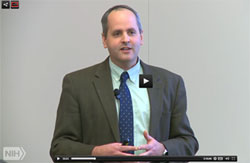UPDATE: The Webinar slides and answers to frequently asked questions are available.
NIGMS Staff Participating in March 8 Webinar
Shiva Singh, Chief, Undergraduate and Predoctoral Training Branch, Division of Training, Workforce Development, and Diversity
Dick Okita, Program Director, Division of Pharmacology, Physiology, and Biological Chemistry
John Laffan, Scientific Review Officer, Office of Scientific Review
Lisa Newman, Scientific Review Officer, Office of Scientific Review
If you’re preparing an institutional training grant application, you might have questions about the new research training tables required for receipt dates on or after the one coming up on May 25. We’ll field these questions during a webinar on Tuesday, March 8, from 1:00-2:30 p.m. EST. You can send questions to me or post them here before the webinar.
The revisions reduce the number of tables from 12 to 8, minimize the reporting of individual-level information and extend the tracking of trainee outcomes from 10 to 15 years. Table 8A must also be used to prepare annual progress reports. Table formats, instructions and samples are available on the NIH website.
To access the webinar, visit https://face2face.nih.gov/hope.mabry/7GZSC5SY (link no longer available) and click “OK.” If you’re away from your computer, you can access the site from a mobile device. You can also listen to a voice-only option by calling 1-888-390-0678 from anywhere in the United States or Canada and entering access code 50106.
We look forward to talking to you about the new training tables.



 I’m very pleased to announce that Dorit Zuk will be joining us in early 2016 as the new director of our
I’m very pleased to announce that Dorit Zuk will be joining us in early 2016 as the new director of our